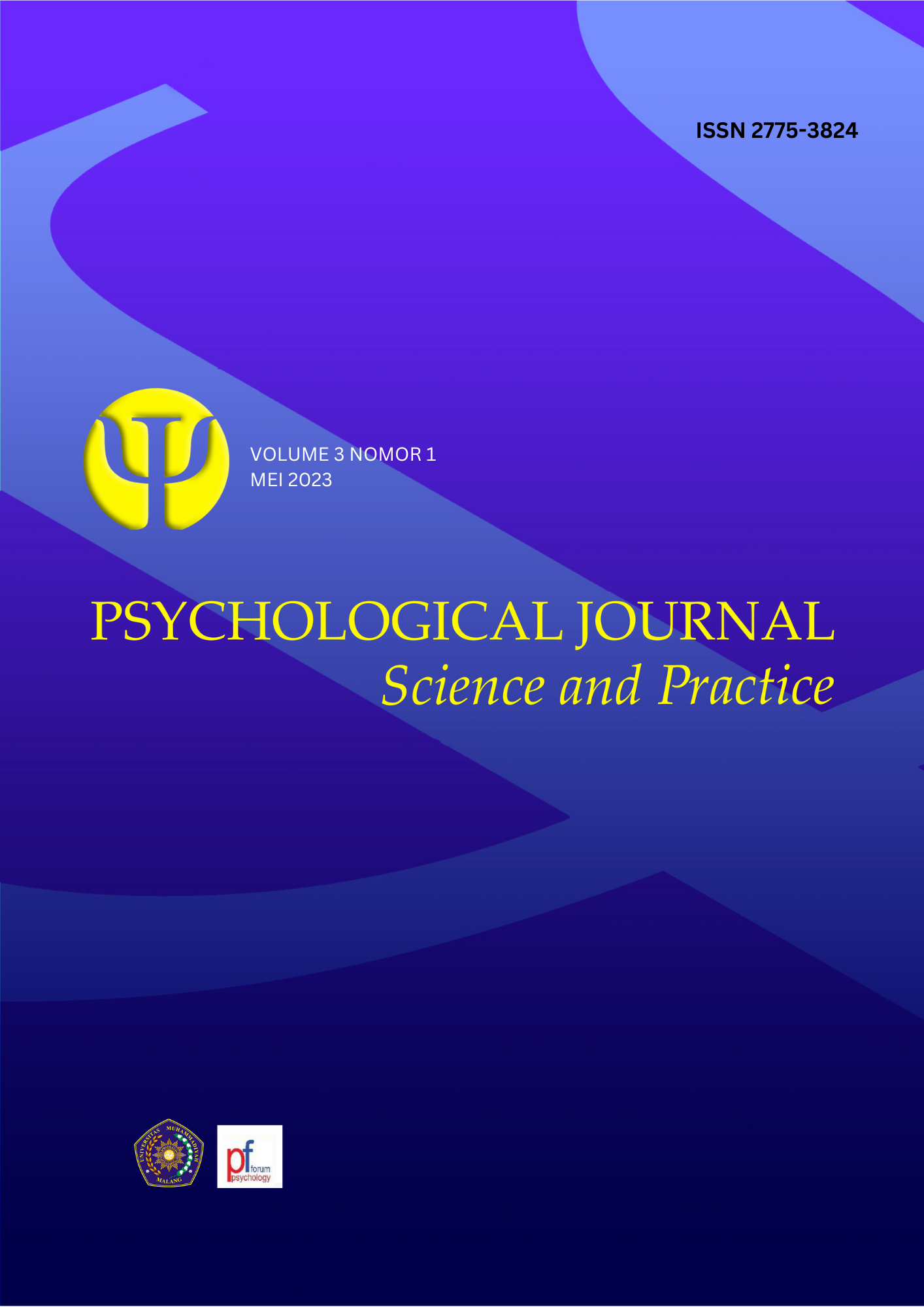Pengaruh Kecanduan Internet Dan Future Time Perspective Terhadap Prokrastinasi Akademik Dikalangan Pelajar
DOI:
https://doi.org/10.22219/pjsp.v3i1.24546Keywords:
prokrastinasi akademik, kecanduan internet, future time perspectiveAbstract
Academic procrastination is the behavior of procrastinating, doing, or completing academic assignments. Academic
procrastination among students can result in academic failure, not even dropping out of classes. This research aimed to determine the influence of Internet addiction and the future perspective on academic procrastination among students. This research was quantitative research with junior high school student research subjects. The measurement tool used is the Young Internet Addiction Diagnostic Questionnaire, the are Procrastination Scale, and the Future Time Perspective for Adolescents and Young Adults. Analysis data using multiple linear regression analysis. This research obtained the coefficient of determination (R² ) at 0.426 and F Sig. 0.000¡0.050. From the results of the t-test, it was found that there was a significant positive effect between addictions internet with academic procrastination with a value of t = 5.641, and there is a significant negative effect between future perspective and academic procrastination with a value of t = -11.543. The beta value in the absolute price for Internet addiction is 0.262, and the beta value for the future time perspective is 0.536, so it can be concluded that the coming time perspective has more influence on academic procrastination.
Downloads
References
Anand, N., Thomas, C., Jain, P. A., Bhat, A., Thomas, C., Prathyusha, P. V, Aiyappa, S., Bhat, S., Young, K., & Cherian, A. V. (2018). Internet use behaviors, internet addiction and psychological distress among medical college students: A multi centre study from South India. Asian Journal of Psychiatry, 37, 71–77.
Aznar-Díaz, I., Romero-Rodríguez, J.-M., García-González, A., & Ramírez-Montoya, M.-S. (2020). Mexican and Spanish university students’ Internet addiction and academic procrastination: Correlation and potential factors. PloS One, 15(5), e0233655.
Barber, L. K., Munz, D. C., Bagsby, P. G., & Grawitch, M. J. (2009). When does time perspective matter? Self-control as a moderator between time perspective and academic achievement. Personality and Individual Differences, 46(2), 250–253.
Blunt, A., & Pychyl, T. A. (2005). Project systems of procrastinators: A personal project-analytic and action control perspective. Personality and Individual Differences, 38(8), 1771–1780.
Brand, M., Young, K. S., & Laier, C. (2014). Prefrontal control and Internet addiction: a theoretical model and review of neuropsychological and neuroimaging findings. Frontiers in Human Neuroscience, 8, 375.
Burka, J., & Yuen, L. (2008). Procrastination Why You Do It, What to Do About It Now (Trish Wilk). Unites Stated of America: Da Capo Press.
Can, S., & Zeren, Ş. G. (2019). The Role of Internet Addiction and Basic Psychological Needs in Explaining the Academic Procrastination Behavior of Adolescents. Cukurova University Faculty of Education Journal, 48(2).
Dariyo, A. (2003). Psikologi perkembangan dewasa muda. Jakarta: Gramedia Widiasarana Indonesia.
Darmawan, D. (2014). Metode Penelitian Kuantitatif. Cetakan Kedua. Bandung: PT. Remaja Posdakarya.
Davis, R. A., Flett, G. L., & Besser, A. (2002). Validation of a new scale for measuring problematic Internet use: Implications for pre-employment screening. Cyberpsychology & Behavior, 5(4), 331–345.
Díaz-Morales, J. F., Cohen, J. R., & Ferrari, J. R. (2008). An integrated view of personality styles related to avoidant procrastination. Personality and Individual Differences, 45(6), 554–558.
Ebrahimi, M., Fathi, A., & Sharifi Rahnmo, S. (2021). Academic procrastination and psychological well-being of female adolescents based on Internet addiction. Information and Communication Technology in Educational Sciences, 12(45), 5–22.
Ferrari, J. R., Johnson, J. L., & McCown, W. G. (1995). Procrastination and task avoidance: Theory, research, and treatment. Springer Science & Business Media.
Ghozali, I. (2018). Aplikasi analisis multivariate dengan program IBM SPSS 25.
Grunschel, C., Patrzek, J., & Fries, S. (2013). Exploring reasons and consequences of academic procrastination: An interview study. European Journal of Psychology of Education, 28(3), 841–861.
Harber, K. D., Zimbardo, P. G., & Boyd, J. N. (2003). Participant self-selection biases as a function of individual differences in time perspective. Basic and Applied Social Psychology, 25(3), 255–264.
Howell, A. J., Watson, D. C., Powell, R. A., & Buro, K. (2006). Academic procrastination: The pattern and correlates of behavioural postponement. Personality and Individual Differences, 40(8), 1519–1530.
Husman, J., & Shell, D. F. (2008). Beliefs and perceptions about the future: A measurement of future time perspective. Learning and Individual Differences, 18(2), 166–175.
Jackson, T., Fritch, A., Nagasaka, T., & Pope, L. (2003). Procrastination and Perceptions of Past, Present, and Future. Individual Differences Research, 1(1).
Jin, H., Wang, W., & Lan, X. (2019). Peer attachment and academic procrastination in Chinese college students: a moderated mediation model of future time perspective and grit. Frontiers in Psychology, 10, 2645.
Kandemir, M. (2010). Akademik erteleme davranışını açıklayıcı bir model. Pegem Eğitim ve Öğretim Dergisi, 4(3), 51–72.
Kandemir, M. (2014). Reasons of academic procrastination: Self-regulation, academic self-efficacy, life satisfaction and demographics variables. Procedia-Social and Behavioral Sciences, 152, 188–193.
Kartadinata, I., & Sia, T. (2008). I love you tomorrow: Prokrastinasi akademik dan manajemen waktu. Anima Indonesian Psychological Journal, 23(2), 109–119.
Kim, J., Hong, H., Lee, J., & Hyun, M.-H. (2017). Effects of time perspective and self-control on procrastination and Internet addiction. Journal of Behavioral Addictions, 6(2), 229–236.
Kiser, M. M. (2020). Validation of the Pure Procrastination Scale. California State University, Fresno.
Lang, F. R., & Carstensen, L. L. (2002). Time counts: future time perspective, goals, and social relationships. Psychology and Aging, 17(1), 125.
Lavoie, J. A. A., & Pychyl, T. A. (2001). Cyberslacking and the procrastination superhighway: A web-based survey of online procrastination, attitudes, and emotion. Social Science Computer Review, 19(4), 431–444.
Lay, C. H. (1986). At last, my research article on procrastination. Journal of Research in Personality, 20(4), 474–495.
Li, Y., Zhang, X., Lu, F., Zhang, Q., & Wang, Y. (2013). Internet Addiction Among Elementary and Middle School Students in China: A Nationally Representative Sample Study. Cyberpsychology, Behavior and Social Networking, 17. 10.108.
Liu, L. Q., Min, G., Yue, S. T., & Cheng, L. S. (2018). The influence of mobile phone addiction on procrastination: a moderated mediating model. J Ergon, 8(232), 2.
Liu, P., & Feng, T. (2019). The effect of future time perspective on procrastination: the role of parahippocampal gyrus and ventromedial prefrontal cortex. Brain Imaging and Behavior, 13(3), 615–622.
Ljubin-Golub, T., Petričević, E., & Rovan, D. (2019). The role of personality in motivational regulation and academic procrastination. Educational Psychology, 39(4), 550–568.
Lyu, H., & Huang, X. (2016). Development and validation of future time perspective scale for adolescents and young adults. Time & Society, 25(3), 533–551.
Nedeljković, J. (2017). The Influences of Time Perspectives on Academic Procrastination. In Time Perspective (pp. 281–304). Springer.
Przepiorka, A., Blachnio, A., & Cudo, A. (2021). Procrastination and problematic new media use: the mediating role of future anxiety. Current Psychology, 1–9.
Rothblum, E. D., Solomon, L. J., & Murakami, J. (1986). Affective, cognitive, and behavioral differences between high and low procrastinators. Journal of Counseling Psychology, 33(4), 387.
Saplavska, J., & Jerkunkova, A. (2018). Academic procrastination and anxiety among students. 19th Scientific Conference. Latvia: Engineering for Pural Development, 23–25.
Senecal, C., Koestner, R., & Vallerand, R. J. (1995). Self-regulation and academic procrastination. The Journal of Social Psychology, 135(5), 607–619.
Senecal, C., Lavoie, K., & Koestner, R. (1997). Trait and situational factors in procrastination: An interactional model. Journal of Social Behavior and Personality, 12(4), 889.
Simons, J., Dewitte, S., & Lens, W. (2000). Wanting to have vs. wanting to be: The effect of perceived instrumentality on goal orientation. British Journal of Psychology, 91(3), 335–351.
Solomon, L. J., & Rothblum, E. D. (1984). Academic procrastination: Frequency and cognitive-behavioral correlates. Journal of Counseling Psychology, 31(4), 503.
Song, Q. Z. (2004). Theoretical and empirical research on future time perspective of university students. Dissertation. Southwest China Normal University.
Specter, M. H., & Ferrari, J. R. (2000). Time orientations of procrastinators: Focusing on the past, present, or future? Journal of Social Behavior and Personality, 15(5; SPI), 197–202.
Steel, P. (2007). The nature of procrastination: A meta-analytic and theoretical review of quintessential self-regulatory failure. Psychological Bulletin, 133(1), 65.
Steel, P., & Klingsieck, K. B. (2016). Academic procrastination: Psychological antecedents revisited. Australian Psychologist, 51(1), 36–46.
Strathman, A., Gleicher, F., Boninger, D. S., & Edwards, C. S. (1994). The consideration of future consequences: weighing immediate and distant outcomes of behavior. Journal of Personality and Social Psychology, 66(4), 742.
Sugiyono, D. (2013). Metode penelitian pendidikan pendekatan kuantitatif, kualitatif dan R&D.
Tras, Z., & Gökçen, G. (2020). Academic Procrastination and Social Anxiety as Predictive Variables Internet Addiction of Adolescents. International Education Studies, 13(9), 23–35.
Van Wyk, L. (2006). The relationship between procrastination and stress in the life of the high school teacher. University of Pretoria.
Wretschko, G. (2006). Problematic internet use, flow and procrastination in the workplace.
Young, K. S. (1999). Internet addiction: symptoms, evaluation and treatment. Innovations in Clinical Practice: A Source Book, 17(17), 351–352.
Young, K. S., & De Abreu, C. N. (2010). Internet addiction: A handbook and guide to evaluation and treatment. John Wiley & Sons.
Yousef, A. M. I. (2020). Future time perspective in its relationship to academic tasks procrastination for secondary stage students. Journal of Research in Curriculum Instruction and Educational Technology, 6(1), 81–113.
Zabelina, E., Chestyunina, Y. U., Trushina, I., & Vedeneyeva, E. (2018). Time perspective as a predictor of procrastination. Procedia-Social and Behavioral Sciences, 238, 87–93.
Zarrin, S. A., Gracia, E., & Paixão, M. P. (2020). Prediction of Academic Procrastination by Fear of Failure and Self-Regulation. EDUCATIONAL SCIENCES: THEORY & PRACTICE, 20(3), 34-43.
Zhang, J. W., & Howell, R. T. (2011). Do time perspectives predict unique variance in life satisfaction beyond personality traits? Personality and Individual Differences, 50(8), 1261–1266.
Downloads
Published
How to Cite
Issue
Section
License
Copyright (c) 2023 Nurul Afifah Asyifak

This work is licensed under a Creative Commons Attribution-ShareAlike 4.0 International License.
Authors who publish with Psychological Journal: Science and Practice (PJSP) agree to the following terms:
- For all articles published in Psychological Journal: Science and Practice (PJSP), copyright is retained by the authors. Authors give permission to the publisher to announce the work with conditions. When the manuscript is accepted for publication, the authors agree to automatic transfer of the publishing right to the publisher.
- Authors retain copyright and grant the journal right of first publication with the work simultaneously licensed under a Creative Commons Attribution-ShareAlike 4.0 International License that allows others to share the work with an acknowledgment of the work's authorship and initial publication in this journal.
- Authors are able to enter into separate, additional contractual arrangements for the non-exclusive distribution of the journal's published version of the work (e.g., post it to an institutional repository or publish it in a book), with an acknowledgment of its initial publication in this journal.
- Authors are permitted and encouraged to post their work online (e.g., in institutional repositories or on their website) prior to and during the submission process, as it can lead to productive exchanges, as well as earlier and greater citation of published wor (See The Effect of Open Access).
This work is licensed under a Creative Commons Attribution-ShareAlike 4.0 International License.








